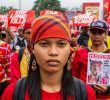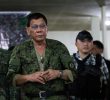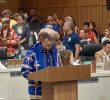DAVAO CITY — A former mayor is implicated by a human rights group’s report on “death squad” killings in Tagum City that felled around 300 people in the past four years.
The Human Rights Watch released a 71-page report titled “One Shot to the Head” : Death Squad Killings in Tagum City, Philippines” on Wednesday, that alleged former Tagum City Mayor Rey “Chiong” Uy and some police officials for involvement in the extrajudicial killings of alleged drug dealers, petty criminals, street children, and other individuals.
“Tagum City’s former mayor helped organize and finance a death squad linked to the murder of hundreds of residents,’” said Phelim Kine, deputy Asia director at Human Rights Watch (HRW).
HRW further claimed that “Rey Uy called these citizens ‘weeds.’ He and other city officials and police officers underwrote targeted killings as a perverse form of crime control.”
Uy was mayor of Tagum from 1998 to 2001, then from 2004 to 2013. His brother Arturo ‘Chongkee’ is currently governor of the nearby province of Compostela Valley.
In a telephone interview with Davao Today, Rey Uy denied the accusations saying “I am always accused of being the person behind the summary killings in Tagum City. Whatever occurs in Tagum, they will charge it directly to me.”
“Ang tinuod diha is kanang ilahang gikuha na mga so-called witnesses, they were coerced, threatened and were paid to make stories about summary killings (The truth is that the ones who are so-called witnesses were coerced, threatened and were paid to make stories about summary killings),” said Uy.
Uy said that the people behind, in what he labelled as “fabricated and callous” charges against him, were “drug and illegal-gambling lords operating in Tagum City.” “(It’s) Very obvious that (these) people won’t allow me to sit as the City Mayor of Tagum, ug sure gyud ko na these witness are paid to say something about the killings (I’m sure that these witnesses were paid to say something about the killings.)”
HRW said police records in Tagum City recorded some 300 extrajudicial killings from 2009 to 2013, but they said police officers believed the figures are even higher. No cases have been brought up to the courts.
The killings and operations of the squad were similar to that of the Davao Death Squad that HRW documented in another report in 2009. The group said the Davao Death Squad boosted the popularity of Davao City Mayor Rodrigo Duterte and “motivated” other municipal officials to “adopt extrajudicial killings as a crime control method.”
HRW based their reports on more than 30 interviews including former death squad members, police officers, witnesses to killings and surviving victims and their families. In a video interview, former death squad member Romnick Minta linked the local government behind their operation.
“We were ordered to get two or three heads every week. The purpose was to clean up Tagum of thieves and other criminals they didn’t like. For us, it was just our job. We got paid by the city,” said Minta.
Minta said he was employed under the city government’s Civil Security Unit.
Part of the operations involved getting orders from the mayor.
“We didn’t plan what we did. It came from the mayor. The mayor would forward texts to Rolly [his aide.] Rolly would forward the texts to us and we’d make the hit. After the hit, we would text Rolly and he would relay that to the mayor and the mayor would reply, “Okay.” Then we would go the mayor’s house. We would get an additional 5,000 pesos [$112] per head,” Minta said.
HRW documented 12 cases including three minors, the youngest at age 9, who were alleged to be vagrants involved in smelling solvents.
Another case involved the killing of a 60 year old indigenous leader of Compostela Valley. The victim’s widow said the killing could have been linked to his refusal to give consent to a mining operation.
But the report said other killings might have been done without the knowledge or consent of Uy, including that of radio commentator Rogelio Butalid, who was killed on December 11, 2013 right outside of the radio station.
“The Tagum Death Squad also apparently carried out “guns-for-hire” operations that Uy was either unaware of or did not specifically commission, such as the killing of a journalist, a judge, at least two police officers, and a tribal leader as well as local politicians and businessmen. In several cases, the death squad’s handlers would fabricate drug allegations against the target of a contract killing to justify to Uy their murder,” the report said.
But Uy said he had “reasons to believe that Butalid has been made a sacrificial lamb” because of the “intense political landscape in Tagum.”
“If they linked Tagum Death Squad to me, unsa man ang atraso ni Tata sa akoa? In my long years in public service, daghan pud comments sa akoa gisulti sa taga-media, pero kay trabaho man na sa taga media it is but normal kay wala man perfect na government (If they linked the Tagum Death Squad to me, what is Tata’s (Butalid) grudge with me? In my long years in public service, many from the media have comments against me but it’s the media’s job and it is normal as no one’s perfect in government)”
Uy added that during his administration “wala man media gipatay (no member of the media were killed).” He said that Butalid has been his “barker for two elections and served as an Emcee during my campaign rallies.” “He was never my critic and I learned that his death has something to do with a family feud with his relatives,” said Uy.
Uy attributed the summary killings in Tagum as a result of either “vengeance or rivalry.” He said also that he doesn’t have any problem with incumbent Mayor Allan Rellon. Uy said that the cases filed against him in the lower court “were dismissed for lack of merit.”
“Pasagdan ko lang na kay dili man kini something new sa akoa. I deny that Tagum Death Squad exists because it is easy to make an issue once you are a Mayor (I would let that [report] be as it is not something new to me. I deny that the Tagum Death Squad exists because it is easy to make issue [against you] once you are a Mayor),” Uy said.
HRW’s Kine blamed the government for failure to probe death squad killings and bring the masterminds to justice.
“The Philippine government’s failure to act decisively against death squad killings has certainly contributed to the horrific death toll in Tagum City, “ Kine said. “President Aquino needs to send a loud and urgent message that deploying death squads as a ‘crime control’ measure is unlawful and needs to stop.”
HRW also said the report showed the failure of the Philippine government to “seriously investigate” death squad killings.
President Aquino has announced the formation of a “superbody” in 2012 to expedite the investigation and prosecution of extrajudicial killings, but human rights groups criticized that no progress has been reported from this group. (davaotoday.com)









